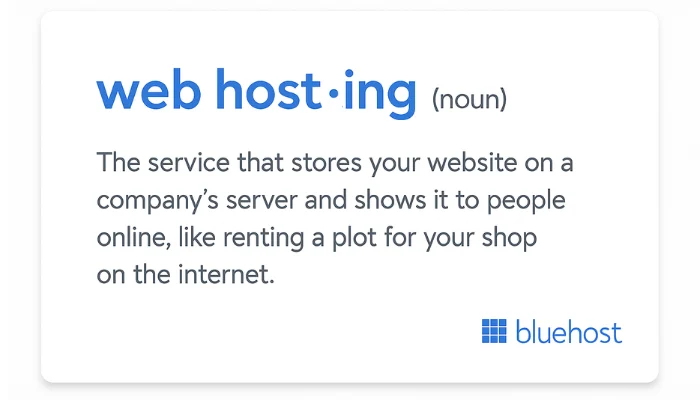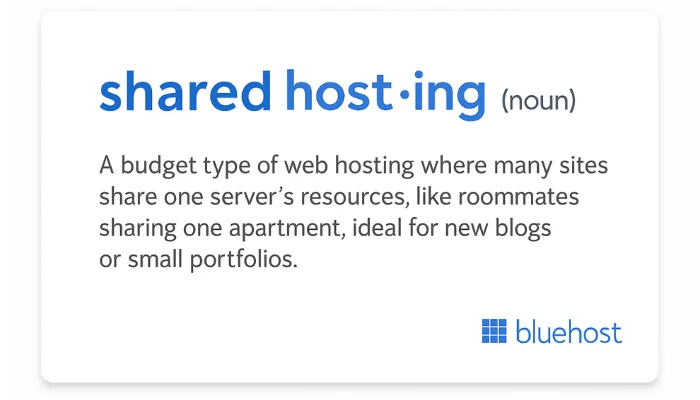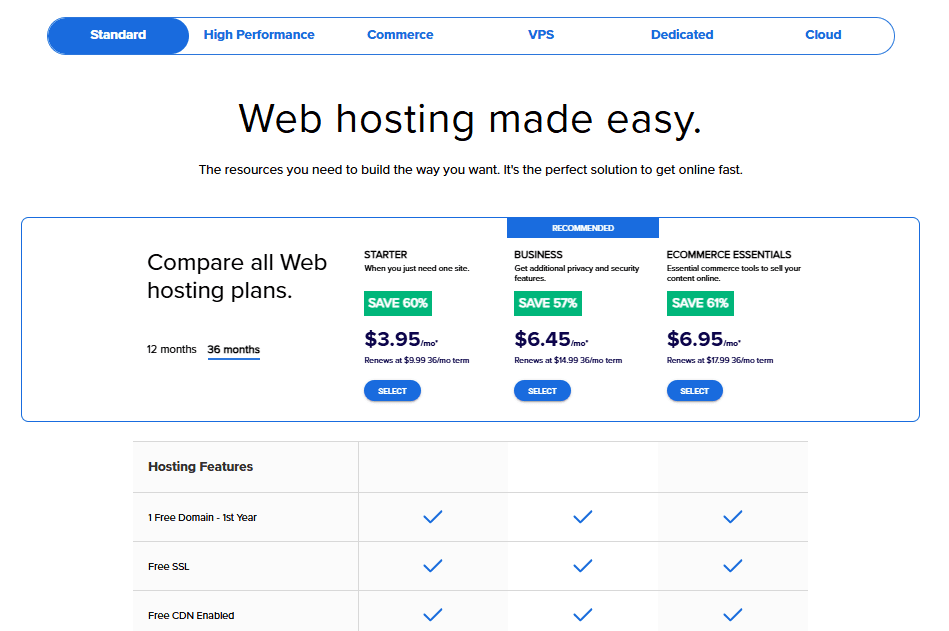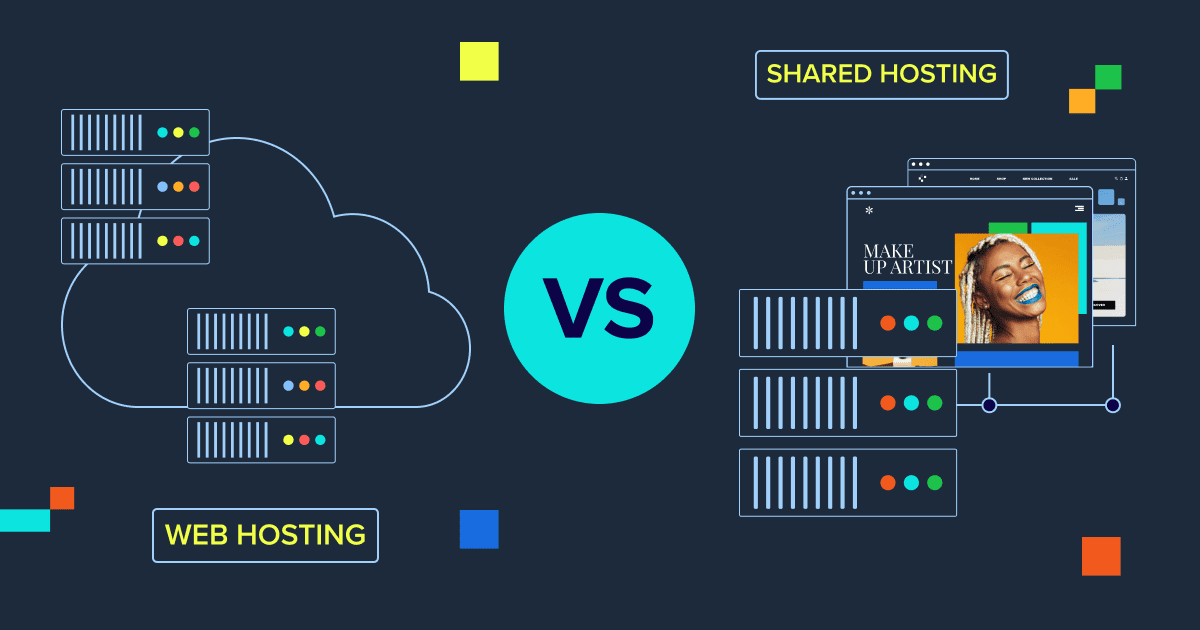Key highlights
- Learn the difference between web hosting vs shared hosting in simple terms.
- Get a side-by-side breakdown of resource allocation, cost, security and scalability.
- Find out when to choose cloud, VPS, shared and dedicated hosting for your site.
- See why shared hosting vs web hosting choice impacts performance, growth and long-term value.
- Learn how Bluehost plans make scaling easier for small businesses and high traffic sites.
Launching a website is exciting, but picking the right hosting can feel overwhelming. Many assume “web hosting” always means “shared hosting,” but that’s not true. Choosing the wrong one can lead to slow load times, unexpected costs and unnecessary stress.
Think of it like housing: “web hosting” is the entire real-estate market; “shared hosting” is one apartment in it. Both can work, but it’s all about what fits your needs now and in the future?
In this guide, you’ll see the exact differences between web hosting vs shared hosting looking at performance, cost, scalability and security. We’ll also understand when to choose each and why Bluehost remains a top choice for hosting that grows with you.
TL;DR: Web hosting vs shared hosting (2026)
Shared hosting is best for beginners due to its low price and ease of use. VPS hosting is ideal for businesses that need scalability, dedicated resources and advanced control. Choose shared hosting to start small, or VPS hosting to handle growth.
Here’s a quick snapshot before we dive deeper:
| Factor | Web hosting (umbrella) | Shared hosting (one type) |
| Definition | Includes shared, VPS, cloud, dedicated plans | One server shared by multiple websites |
| Cost | Varies: $3.95–$100+/month depending on type | Entry-level: starts at $3.95/month (renews $9.99) |
| Performance | VPS/Dedicated = fast, stable | Can slow down if other sites use resources |
| Control | VPS/Dedicated = full root access | Minimal control, beginner-friendly |
| Security | Stronger with VPS/Cloud/Dedicated | Basic protections, higher shared risk |
| Scalability | Easy upgrades as traffic grows | Limited, must upgrade plans |
Verdict: Choose shared hosting if you’re starting small on a budget. Pick VPS, cloud or dedicated hosting if you need more resources, performance and security.
Web hosting vs shared hosting: Overview
Before diving into the differences, let’s first understand what each term really means.
What is web hosting?
Web hosting is a service that stores website files on a physical server and makes them accessible online. It provides essential server resources like storage, bandwidth and memory to ensure websites run smoothly for visitors worldwide.
In practice, a web hosting provider offers server space and technologies that allow your website to stay live on the internet. Different types of web hosting include VPS (virtual private server), cloud, shared and dedicated hosting. Each differs in how resources are allocated and managed.

If you own a small personal site, a growing eCommerce store or even multiple websites, there’s a hosting plan suited for your needs. Choosing the right hosting solution depends on expected traffic, customization needs and budget.
What is shared hosting?
Shared hosting is a type of web hosting where multiple websites share the same server resources. It’s the most affordable, beginner-friendly option for small businesses, personal sites and first-time bloggers.
The costs stay low because you’re sharing resources with other sites on the same server. Shared hosting plans often include essentials like free SSL, email accounts, AI Website Builder and 24/7 support. These features simplify website management for beginners with limited technical knowledge.

The trade-off is performance: if other websites on the server experience high traffic or heavy resource usage, your site may slow down. That’s why shared hosting providers are best for lightweight sites that don’t demand dedicated resources.
Verdict: Shared hosting is a budget-friendly starting point, ideal for small business or personal sites but limited in performance and scalability. Web hosting is the umbrella service that powers all the sites, no matter which hosting type you choose.
Shared hosting vs web hosting: Differences at a glance
When comparing shared hosting vs web hosting, the easiest way is through a quick snapshot. This table highlights how each hosting solution differs in server resources, performance, security and overall value. It helps website owners choose the right hosting environment before investing in a plan.
Comparison table: Shared hosting vs web hosting
| Factor | Web hosting | Shared hosting |
|---|---|---|
| Definition | A broad service covering all types of web hosting solutions. | A type of web hosting where multiple websites share the same server environment. |
| Server resources | Flexible allocation depending on hosting type (shared, VPS, cloud, dedicated). | Limited; resources are split among other websites on the same server. |
| Performance | Can scale with more resources through VPS hosting or dedicated hosting plans. | May slow down if other sites consume heavy resources. |
| Cost | Pricing varies; premium plans cost more. | Cheapest hosting option; shared hosting plans are budget-friendly. |
| Control & customization | VPS/dedicated hosting offer full root access and server settings control. | Minimal customization; no root access. |
| Security | Stronger with VPS, cloud hosting services, or dedicated web hosting. | Basic protections; shared hosting providers can’t fully isolate risks from other users. |
| Scalability | Easily upgraded; move to VPS hosting, cloud or dedicated servers as traffic grows. | Limited scalability; once your site experiences high traffic, you must upgrade. |
| Best for | Flexible choice: personal sites, small businesses or high traffic websites. | Ideal for beginners, budget constraints or personal websites needing simple hosting services. |
Web hosting providers offer many options, but shared hosting services are the entry point, low-cost and user-friendly. If you expect traffic growth or need more resources, start with shared hosting and plan your upgrade path early.
Web hosting vs shared hosting: In-depth comparison
Now that we’ve looked at the quick differences, let’s dig deeper. Each hosting type varies when it comes to:
- Resource allocation & performance
- Cost & value trade-offs
- Control & customization
- Security & isolation
- Scalability & growth paths
Understanding these factors will help you pick the right web hosting plan that fits both your budget and growth plans. Let’s explore each of these aspects in detail.
1. Resource allocation & performance
Here’s how resource allocation and performance differ for web hosting vs shared hosting:
Web hosting
In web hosting, the amount of server resources you get depends on the hosting environment you choose. With VPS hosting, cloud hosting or dedicated hosting, you enjoy more resources and better isolation. This means faster load times, fewer slowdowns and the ability to handle high traffic websites.
Want more control but not ready for dedicated hosting yet? Choose Bluehost VPS hosting and get superior processing power, DDR5 RAM and ultrafast NVMe storage.
Shared hosting
In shared hosting, multiple websites share the same server resources as CPU, RAM and bandwidth. This keeps costs low but also means resource availability fluctuates.
If other websites on the same server consume more bandwidth or run heavy applications, your site’s performance may drop. Shared hosting providers usually monitor usage, but you won’t have guaranteed dedicated resources.
Verdict: Web hosting offers flexible resource allocation and high performance when you choose VPS, cloud or dedicated options. Shared hosting remains affordable but sacrifices speed and stability when other sites spike in traffic.
2. Cost & value trade-offs
Now let’s explore how cost and value differ for shared hosting vs web hosting:
Web hosting
The cost of web hosting varies widely depending on the type of hosting plan you choose. Entry-level shared hosting plans are the cheapest. VPS hosting, cloud hosting and dedicated server hosting command higher prices because they include more resources, customization and scalability.
For businesses expecting growth, these higher-tier hosting solutions offer better long-term value. You get consistent performance, advanced security measures and greater control over your server environment.
Shared hosting
Shared hosting is the most affordable hosting option available. Bluehost Shared hosting starts at $3.95/month (renews $9.99), making it perfect for personal websites, small businesses or site owners with budget constraints who don’t yet need advanced performance.
These plans often include:
- Free SSL certificates
- CDN integration
- 24/7 support
- Free domain for the first year
While the upfront cost is attractive, the trade-off is limited scalability and potential performance dips. Eventually, upgrading becomes necessary as your site grows.
Bluehost makes upgrading seamless with a zero-downtime migration guarantee. You can upgrade from shared hosting to VPS or dedicated hosting as traffic increases without interrupting your site.

Note: Pricing changes frequently by term and region. Check the pricing page for current offers and renewal rates.
Verdict: Shared hosting wins on affordability, but broader web hosting types deliver stronger value when you factor in scalability and performance. The smartest approach is starting small, then upgrading as your website’s needs evolve.
3. Control & customization
Here’s how web hosting vs shared hosting differ based on control and customization:
Web hosting
Web hosting gives you flexibility in how much control you want. With VPS hosting or dedicated server hosting, you can configure server settings, install custom software and even gain root access. This level of control appeals to developers and businesses with technical skills. It allows fine-tuning performance, security and application management.
Want full root access and deep customization? Consider Bluehost Dedicated hosting for maximum performance and control.
Shared hosting
Shared hosting limits your control because you’re on a shared server environment. Root access isn’t available, and customization is restricted to what the web hosting company provides.
You can still use user-friendly control panels to manage your site, set up email accounts and install popular plugins. But you won’t have the freedom to modify server administration settings. This simplicity is perfect for beginners but not for advanced users who want tailored configurations.
Whether you’re a beginner using WordPress or a developer managing multiple sites, Bluehost makes scaling control effortless. Explore Bluehost hosting plans to find the level of control that fits your needs.
Verdict: Web hosting gives you more control and customization when you move up the ladder, while shared hosting prioritizes simplicity. Choose shared hosting if ease-of-use matters most, or advanced plans if flexibility is your priority.
4. Security & isolation
Let’s explore the difference between shared hosting vs web hosting based on security and isolation:
Web hosting
Security in web hosting depends on the hosting type you select. VPS hosting, cloud hosting and dedicated hosting provide stronger isolation between websites, reducing the risk of one compromised site affecting another.
Advanced protections often include:
- Firewalls and malware scanning
- Dedicated IP addresses
- SLA-backed 99.9% uptime guarantee
- External monitoring tools like Pingdom, GTmetrix and UptimeRobot for performance tracking
This makes higher-tier hosting solutions better suited for compliance-heavy industries and high traffic websites where uptime and data protection are critical.
Shared hosting
With shared hosting, multiple websites share the same server environment. While shared hosting providers implement basic protections like SSL certificates, firewalls and automated backups, the risk is inherently higher.
If one site on the same server gets hacked or overloaded, it may impact other users. This makes shared hosting less ideal for eCommerce stores, financial sites or businesses handling sensitive data.
Bluehost enhances shared hosting security with:
- Built-in SSL certificates
- Daily backups with CodeGuard add-on for advanced recovery
- Jetpack Security for real-time threat monitoring
- Proactive server monitoring powered by Oracle Cloud Infrastructure (OCI)
For better visibility in search results, Bluehost also integrates Yoast SEO with WordPress, ensuring your site is secure and optimized for rankings.
Ready to go online? Get Bluehost Shared hosting and set up your website within a few minutes.
Verdict: Web hosting options like VPS, cloud or dedicated hosting deliver stronger security and isolation. Shared hosting is best suited for smaller sites with lower risk. For sensitive or business-critical projects, upgrading is essential and Bluehost’s seamless migration guarantee ensures you can scale without downtime.
5. Scalability & growth paths
Here’s how scalability and growth paths differ for web hosting vs shared hosting options:
Web hosting
One of the biggest advantages of web hosting is scalability. If your site experiences high traffic, you can upgrade seamlessly to VPS, cloud or dedicated hosting. These advanced solutions provide:
- More server resources
- Better performance and uptime
- Flexibility to manage multiple websites or resource-heavy applications
Need elastic capacity and a stronger uptime commitment? Bluehost WordPress Cloud hosting includes a 100% network uptime SLA and global CDN, designed to keep sites fast during traffic spikes.
Shared hosting
Shared hosting is designed as a starting point, not a long-term growth engine. While it works well for personal websites and small businesses, it lacks scalability. Once your site grows, you’ll quickly hit limits on:
- Bandwidth
- Storage
- CPU and memory resources
At that point, upgrading becomes inevitable. With Bluehost, you get a zero-downtime migration guarantee. So, moving from shared hosting to VPS or dedicated hosting is smooth and stress-free.
Verdict: Web hosting provides clear upgrade options to match your growth, while shared web hosting is only an entry point. If you expect your site to scale, begin with shared hosting but plan ahead for timely upgrades.
Web hosting vs shared hosting: When to choose what?
Choosing between web hosting vs shared hosting depends on your website’s size, traffic expectations and growth plans. Here’s when shared hosting makes sense, and when you should avoid it.
Choose shared hosting if
- You’re launching a personal website, blog or portfolio with limited traffic.
- Ideal for small businesses with budget constraints that don’t yet need advanced server resources.
- Beginner-friendly control panels and essential features without the server’s technical expertise.
Bluehost shared hosting plans include free CDN and SSL, so your site loads faster and stays secure even at entry-level pricing. Start with Bluehost shared hosting today!
Avoid shared hosting if
- You’re running high traffic sites, eCommerce stores or business-critical applications
- Performance, uptime and security are non-negotiable
- Basic security measures aren’t enough for compliance-heavy industries
Bluehost’s VPS and dedicated hosting plans deliver more resources, stronger isolation and full root access for advanced control. Explore Bluehost VPS and Dedicated hosting plans.
Clear upgrade signals (when to move to VPS vs dedicated vs cloud)
- Your site experiences high traffic and slows down regularly.
- You need more resources like higher bandwidth, disk space or CPU.
- Security requirements increase (for example, handling sensitive customer data).
- You want customization at the server level, which requires root access.
VPS hosting balances cost and resources, cloud hosting ensures flexibility and dedicated hosting delivers maximum performance.
With Bluehost, upgrading is seamless with no downtime, no migration stress. Our high-performance web hosting grows with you. Choose Bluehost today!
Verdict: Upgrade from shared hosting once traffic and resource needs outgrow your current plan. But delaying the migration can risk poor performance and lost visitors.
Shared hosting vs other types of web hosting
Shared hosting is just one option under the umbrella of web hosting services. To decide whether it’s right for you, it helps to compare it with other popular hosting solutions like VPS, cloud, dedicated and managed WordPress hosting.
Quick comparison: Shared vs VPS vs Cloud vs Dedicated vs WordPress hosting
| Factor | Shared hosting | VPS hosting | Cloud hosting | Dedicated hosting | Managed WordPress hosting |
| Resources | Limited, shared with other websites. | Partitioned virtual server; guaranteed resources. | Distributed across multiple servers; scalable on demand. | Full access to an entire server with dedicated resources. | Optimized server resources for WordPress only. |
| Performance | May slow if other sites use heavy resources. | Stable, better than shared; isolated resources. | Highly reliable; downtime risk spread across servers. | Maximum performance with dedicated server hosting. | Excellent WordPress speed, caching and optimization |
| Control & customization | Minimal; no root access. | Root access available; configure server settings. | Moderate; depends on provider. | Full control and root access. | Limited server access; provider manages optimization |
| Security | Basic SSL and firewalls; shared environment risk. | Stronger isolation; fewer risks from other users. | Highly secure; redundancy adds protection. | Highest level of isolation and custom security measures. | Built-in WordPress-specific security and updates. |
| Scalability | Limited; must upgrade plans. | Easy to scale within VPS tiers. | Extremely scalable; add resources instantly. | Harder to scale; requires physical upgrades. | Limited scaling but optimized for WordPress growth. |
| Best for | Beginners, personal sites, small businesses. | Growing websites needing more resources. | Businesses with fluctuating traffic. | Enterprises, compliance-heavy industries, high traffic websites. | Bloggers, creators and site owners focused only on WordPress hosting. |
Shared hosting is the budget-friendly entry point. VPS, cloud and dedicated hosting provide more resources and stronger performance as your site grows. Managed WordPress hosting is a niche solution for users who want only a WordPress hosting environment with less technical management.
Looking for a perfect home for your WordPress website? Choose Bluehost WordPress hosting and get ultrafast, all-in-one platform.
Also read: WooCommerce Hosting vs Web Hosting: What’s the Difference & Which Do You Need?
Why is Bluehost the best web hosting provider?
Bluehost offers high-performance web hosting plans that grow with you. We’re a WordPress.org recommended host, trusted by over 5 million WordPress users worldwide. You get a wide range of premium web hosting plans from shared hosting to dedicated hosting.

Bluehost focuses on performance and continuous infrastructure upgrades. We are migrating our infrastructure to Oracle Cloud (OCI), which is aimed at improving reliability and speed.
Here’s why Bluehost is consistently ranked among the best web hosting companies:
1. Protect, backup and launch faster
Bluehost includes everything modern website owners expect in a hosting solution:
- Free SSL certificate to protect visitors’ data
- Automated daily backups with CodeGuard add-on for advanced recovery
- One-click staging environment for safe testing before pushing changes live
- Built-in CDN integration to speed up global performance
- Security upgrades with Jetpack Security for malware scanning and real-time protection
- SEO-focused tools like Yoast SEO to help you rank higher
- 24/7 expert support, available whenever you need help
With these essentials included, you save on add-ons that other WordPress hosting providers often charge extra for.
2. No surprise costs, transparent pricing
Many hosting providers lure users with low intro prices but raise costs sharply at renewal. Bluehost offers transparent pricing with no hidden surprises. Shared hosting prices starts at $3.95/month (renews $9.99), while upgrades to VPS, cloud hosting or dedicated hosting are competitively priced.
By bundling SSL, CDN and backups into the plan, we help you save money compared to hosting companies that charge separately for these must-have features. Compare Bluehost web hosting prices and see the value difference.
3. Keep your site fast and reliable
Website performance is all about consistency. Bluehost OCI powered infrastructure improves uptime, reliability and reduces response times.
Independent benchmarks showed Bluehost page loading in 0.44 seconds in the US, outperforming SiteGround, Hostinger and DreamHost. This means your site stays online, loads fast and is prepared for growth without frequent downtime.
Bluehost delivers more than just web hosting. We provide a growth-ready platform with top-tier features, honest pricing and performance proven to outrank competitors.
Final thoughts
Choosing between web hosting vs shared hosting comes down to understanding your site’s current needs and future growth. Shared hosting is a cost-effective starting point, perfect for personal sites and small businesses. But as traffic grows, upgrading to VPS, cloud or dedicated hosting ensures you have the infrastructure to keep up.
The good news is you don’t need to overthink it. Start small, monitor your growth and upgrade when the signals are clear. With Bluehost, starting and scaling up is seamless and stress-free.
Ready to find your perfect hosting plan? Check Bluehost’s pricing page and build a platform designed to grow with you.
FAQs
Web hosting is the umbrella term for all hosting types, while shared hosting is one type under it. Web hosting includes VPS, cloud, dedicated and shared options. Shared hosting means multiple sites share the same server resources. Bluehost offers all hosting types, making it easy to start small and upgrade as you grow.
Yes, it’s secure for beginners, but isolation is limited compared to VPS or dedicated hosting. Most shared hosting plans include SSL, firewalls and monitoring. For stronger protection, Bluehost lets you add Jetpack Security or CodeGuard backups and upgrade seamlessly when your business expands.
Yes, but WooCommerce hosting offers more specialized tools. For building high performing online stores, consider Bluehost WooCommerce plans that include booking, gift cards, product filters and YITH plugins.
Yes, shared hosting is the most affordable plan at $3.95/month (renews $9.99). Bluehost shared hosting also includes SSL, CDN, a free domain for one year and 24/7 support at entry-level pricing.
VPS, cloud and dedicated hosting are better than shared hosting for heavy traffic. They provide isolated resources, higher performance and stronger security. Bluehost VPS and Dedicated Hosting are powered by OCI to handle surges without downtime.
Yes, upgrades from shared hosting to VPS or dedicated are seamless with Bluehost. Migration comes with a zero-downtime guarantee, so your site scales smoothly as needs increase.
Shared hosting is for beginners, VPS is for growing websites. Shared hosting suits blogs or personal sites on a budget. VPS hosting provides more resources, root access and scalability. Bluehost supports both with smooth upgrade paths.
Yes, basic backups are included, with options for advanced daily backups. Bluehost shared hosting includes automated backups, and you can add CodeGuard for daily backups or Jetpack Security for extra protection.
Yes, it comes optimized for SEO with built-in speed and security tools. Bluehost includes SSL, CDN, NVMe storage and integrates with Yoast SEO, helping your site rank higher.
Indirectly, yes, if servers are slow or downtime is frequent. Bluehost shared hosting, powered by OCI, ensures fast load times and reliable uptime, reducing SEO risks.



Write A Comment